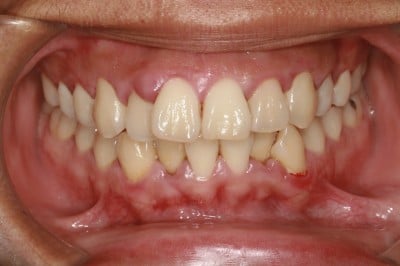
What Is Gum Disease?
Gum disease is when harmful bacteria collect in the pockets around your teeth and cause damage there. The mild form is called gingivitis. It causes your gums to get red and swollen. Some people have chronic gingivitis that never develops into more serious conditions, but most often gingivitis is a sign that you may be in danger of further damage and lost teeth.
The more severe form of gum disease, called periodontitis, is when you get larger colonies of bacteria in your gum pockets. Their harmful secretions damage your gum tissue, causing it to become red, inflamed, and bloody. You lose gum tissue, as the pockets deepen, making room for more bacteria. Eventually, the pockets get deep enough that the bacteria can attack your jawbone and the ligaments that hold your teeth in place, resulting in tooth loss possibly requiring dental implants. In severe cases, the infection can spread to your ears, sinuses, and even brain, which can be fatal.
Gum Disease Contributes to Systemic Illness
Gum disease doesn’t just affect the health of your mouth and lead to tooth loss. It can actually contribute to your risk of developing many other illnesses. It has been linked to:
- Heart disease
- Stroke
- Rheumatoid arthritis
- Pregnancy complications
- Respiratory disease
- Diabetes
Heart disease is the leading killer in Australia, and it turns out that gum disease is a major contributor to this—and a potential solution. A recent study in Aboriginal Australians found that gum disease treatment was equivalent to cutting your bad cholesterol levels by 30 percent, reducing your age by four years, or dropping your BMI by 8 in terms of reduced heart disease risk.
Diabetes and gum disease seem to have a dynamic relationship in which each one makes the other worse. Developing gum disease seems to make it harder to keep blood sugar levels under control, while uncontrolled blood sugar levels increase the risk for gum disease.
Preventing Gum Disease
Gum disease is a condition best avoided. To make sure you don’t suffer from it, you have to make sure you have an adequate oral hygiene routine at home, and make your regular oral hygiene dental visits. This will protect your teeth and gums from future damage.
If you would like to learn more about gum disease in the Baulkham Hills area of Sydney, including both prevention and treatment, please contact My Hills Dentist today.

